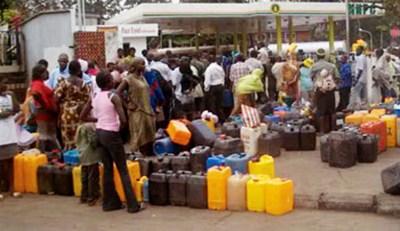
Nigeria is suffering from a gasoline shortage as falling oil prices have affected the country’s ability to import and distribute refined fuels. Coming just weeks before elections scheduled for March 28, the shortage could have a big impact on the campaign trail.
In Abuja, the lines of cars waiting for gas are growing longer. Acute fuel shortages are gripping towns and cities across the country. Workers reliant on their cars are losing money fast – like taxi driver Bartholomew Ode Akpa.
“I work at the airport as a car hire and now I’m supposed to be at the airport and there is no fuel for me to go and look for something to do,” he said.
Nigeria is one of the world’s top producers of crude oil, and exports around 2 million barrels per day. But it doesn’t have the refinery capacity to meet fuel demand, so it relies on imports. That makes the country vulnerable to a turbulent market, says Virginia Comolli of the International Institute for Strategic Studies.
“Although Nigeria has tried over the past few years to diversify its economy, 80 percent of government revenues are still dependent on the oil industry,” said Comolli.
The falling oil price has hit Nigeria’s currency, the naira – and traders say government fuel subsidies are not being paid.
The CEO of the Seplat Petroleum Development Company, Austin Avuru, is calling on the government to boost domestic refining capacity.
“Then you find out that the boom and bust elements of changes in crude oil prices will have much more negligible impact on our GDP growth than we are having today, and I think that’s how our country should be moving in terms of how they manage their natural resources,” said Avuru.
Nigerian Minister of Aviation Osita Benjamin Chidoka told VOA President Goodluck Jonathan was trying to reduce Nigeria’s dependence on crude oil production.
“One of our major foreign currency earners is oil. But it is also an opportunity for Nigeria. It creates an opportunity for us that luckily our President has committed to improving agriculture over the past few years. Diversifying the economy, removing the subsidies that are kind of willing a dependency culture,” said Chidoka.
The timing is difficult for President Goodluck Jonathan as he campaigns, trying to secure another four years in office. The elections have already been postponed once due to insecurity caused by the Boko Haram insurgency.
It’s not only Nigeria that is suffering, says Virginia Comolli.
“Other regional countries, countries that export their goods into Nigeria, will suffer from a reduction in demand from the Nigerian market,” said Comolli.
Analysts warn that continued low oil prices have the potential to cause unrest, because the government will be forced to cut back on public spending.
FRENCH VERSION
À Abuja, les lignes de voitures en attente pour le gaz sontdéveloppent plus longtemps. Pénurie de carburant aiguë saisirvilles et villes dans tout le pays. Travailleurs dépendent de leursvoitures perdent de l’argent rapidement – comme chauffeur detaxi Akpa Ode Bartholomew.
« Je travaille à l’aéroport comme une location de voitures etmaintenant je suis censé pour être à l’aéroport et il n’y a pas decarburant pour moi d’aller chercher quelque chose à faire », dit-il.
Le Nigéria est l’un des principaux producteurs mondiaux depétrole brut et exporte environ 2 millions de barils par jour. Maisil n’a pas la capacité de raffinage pour satisfaire la demande decarburant, donc elle s’appuie sur les importations. Qui rend lepays vulnérable à un marché turbulent, dit Virginia Comolli del’Institut International d’études stratégiques.
« Bien que le Nigéria a tenté au cours des dernières années àdiversifier son économie, 80 pour cent des recettes dugouvernement sont encore tributaires de l’industrie pétrolière, »dit Comolli.
Le prix du pétrole baisse a frappé monnaie du Nigéria, le naira –et commerçants dire subventions de carburant ne sont paspayées.
Le PDG de la société de développement de pétrole Seplat, AustinAvuru, appelle le gouvernement à renforcer les capacitésnationales de raffinage.
« Puis vous découvrez que la perche et buste éléments deschangements dans les prix du pétrole brut aura un impactbeaucoup plus négligeable sur la croissance de notre PIB quenous menons aujourd’hui, et je pense que c’est comment notrepays devrait se déplacer en fonction de la façon dont ils gèrentleurs ressources naturelles, » a dit Patrick.
Ministre nigérian de l’Aviation Osita Benjamin Chidoka dit que VOA Président Goodluck Jonathan s’efforce de réduire ladépendance du Nigéria sur la production de pétrole brut.
“Un de nos salariés des principales devises étrangères est l’huile.Mais c’est aussi une occasion pour le Nigeria. Il crée uneopportunité pour nous que Heureusement notre Président s’est engagé à améliorer l’agriculture au cours des dernières années.Diversification de l’économie, en supprimant les subventions quisont prêts genre d’une culture de la dépendance,”a dit aicha.
Le moment est difficile pour le Président Goodluck Jonathan caril milite, essayant de fixer un autre quatre ans dans le bureau. Lesélections ont déjà été reportées une fois en raison de l’insécuritécausée par l’insurrection de Boko Haram.
Il n’est pas seulement le Nigeria qui souffre, dit Virginia Comolli.
« Les autres pays de la région, les pays qui exportent leursmarchandises au Nigéria, souffriront d’une réduction de lademande du marché nigérian, » a dit Comolli.
Les analystes avertissent que les prix du pétrole bas continu ontle potentiel de causer des troubles, parce que le gouvernementdevra réduire les dépenses publiques.


